Here’s a byline I can get behind: right hand pointing – “an online literary journal of very brief pieces for smart people with short attention spans.” Finally. I also appreciate the Submissions Slide Show and Hate Mail page.
Why the Anonymity?
A recent issue of interest has been the growing number of editors and publishers of online and print magazines keeping themselves “anonymous.”
Quite frankly, we’re finding this to be a more disturbing trend than not for a number of reasons.
One of the first is that blatant anonymity makes us suspect of the publication, of its validity and credibility.
When considering publications to list on NewPages, one of our minimal requirements is that there has to be an identifiable person who is willing to take responsibility for the finished product. Not being able to know the name of someone to contact if there is a problem, a question, or a concern makes the whole venture seem shady and fly-by-nightish. It’s one thing when no one identifies themselves on the web site, but when we write and ask for a contact, purely for our in-house information, and are denied this – we don’t feel this is a publication NewPages can recommend to our readers.
In the past, our readers have turned to us for help when they had concerns about such matters as how a contest was being run, when they could not get a reply on submissions, or even when their subscription stropped showing up and they could not contact the publisher. In these situations, we have contacted the publication and in most all cases, helped to resolve the situation. Not knowing who someone is does not help to create a working relationship, nor does it seem terribly collegial in the sense of literary community. In fact, it seems quite the opposite, which is exactly what it seems some publications mean to project.
If I had a dime for every time lit mags professed “we don’t want names to matter” and “we’re out to be different from the establishment”… Really, this is a highly cynical position to take against the many good, decent publications out there that indeed have had and currently have people working for them who are ethical, respectful, and concerned about the welfare of literature and publishing. This idea that keeping editors anonymous is the more ethical and just way to run a publication seems to call a lot of great work done by others corrupt.
Checking the backgrounds of those associated with the numerous new publications that crop up weekly is an effort that we make on behalf of our readers. Of course, as the saying goes, anyone can be a dog on the Internet, but we do look at names and attempt to verify these for any publications we list in our guides. We have always attempted to run NewPages as a site which recommends quality publications; we are not a clearinghouse of anything and everything out there – and our readers tell us they appreciate this about our site. If anything, anonymity in publications that claim high ethical standards give us an opposite opinion and raise many other questions: Are the editors publishing themselves? Are they publishing their friends? Honestly, how are we to know?
In terms of editorial credibility, it is helpful for writers as they are looking for places to submit their work to know the background of the people not only making the selections of the work, but who might also be editing their words. Certainly, there will be some people so eager for publication that it doesn’t matter to them, but I would like to know that my work will be given critical consideration – not turned away because it might have been too obscure for Mr. Smith’s eleventh grade class to understand, or, worse yet, published with errors I may have missed and Bill & Ted on their excellent publishing adventure really didn’t know enough to correct. I think most writers consider editors their “peers” in some way – at least in the sense that they will help a writer to grow through both acceptance and rejection and not allow their writing to make a fool of either writer or publication once it’s published.
At the professional level, the anonymous stance seems an immature one. I don’t know of any anonymous publication that has had any longevity. I can’t help but say it seems like a “youthful” attitude of self-righteousness and indignation – and one that won’t last long for any publication. Though I could be wrong – I’ll check back with some of you anonymous folks ten years from now – heck, five years from now, and we’ll see if you’re still around – or rather, if your publication is still around.
I have to ask about any writer submitting to an anonymous publication. Is this something to list on your publishing credentials? Is there any scrutiny of that? Again, I certainly do understand that for some people, this is not a concern, but I’m focusing on what we’re choosing to list here on NewPages and what our readers expect of what they’ll find here (aka our work).
I know at the higher professional levels, to list publications on our accomplishments, those publications have to have a verifiable editorial or peer review process. So, as much as I might admire the work I see on an anonymous publication, I can’t send in my work if I later want it considered for, oh, I don’t know, say a job I’m applying for, or promotion, or tenure. In fact, I recently reviewed an applicant’s resume and called into question two of the publications listed. I don’t think this would necessarily cost the applicant the job, but in some cases where this could make the difference, I think writers need to be careful about using such publications to bolster their credentials. Interestingly enough, in each of the anonymous publications I have seen so far, contributors include bios which list their publishing credentials. Slightly hypocritical, if names don’t matter – ?
Ultimately, it seems to me these spirited, young, anonymous publications are quickly finding their way around – mostly online – and if writers want to submit to them – for fun – they should by all means go ahead and do so. But as quickly as these efforts are sprouting up, they will also find their anonymous editors moving along to greener, more name-worthy publications. Ultimately, this is as any venture in life – user beware. I can’t think of too many situations in which I would engage in a working relationship with someone who insisted on remaining anonymous, though this might just be yet another of the web-future trends of publishing.
As for now – NewPages is not listing publications who insist on remaining anonymous. We have had long discussions about this, both in-house and with publications whose editors both have made themselves known to us and those who refuse to do so. We will continue to attempt to come to some understanding of this new phenomenon, but for now, we’ve had to make this a deciding factor in listings for our guides.
Old Lit Back on the Block :: Red Line Blues
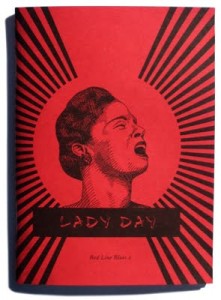 It’s nice to see a publication find their way back after one of those short breaks that often become permanent. Red Line Blues, a theme-based journal from Brooklyn, NY and Asheville, NC is back from their hiatus.
It’s nice to see a publication find their way back after one of those short breaks that often become permanent. Red Line Blues, a theme-based journal from Brooklyn, NY and Asheville, NC is back from their hiatus.
From the Red Line Blues Crew (Moriah Norris-Hale, Erich Nagler, and Benjamin Yanes): “We’ve been on hiatus for the past few months (ok, perhaps a year) renovating barns, traveling to Finland and back, and weathering the ole recesh’. We’re stoked to be back in the saddle and hope you’ll join us for issue #7.”
The upcoming theme for the issue is “Lean Times”: “Now that a full year’s limped by since Lehman went belly up, we’re marking the era with the theme ‘Lean Times.’ We’re casting the net for prose, poetry, photos, prints, drawings, and songs that illuminate our recent [in]securities, and tell the tales of staying afloat in the downturn. All submissions are due by Halloween, 2009 (Saturday, October 31st).”
See their website for further details.
AQR All-Prose Issue
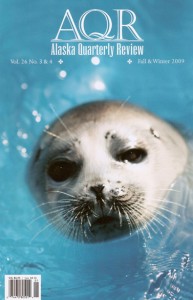 Nothing against poetry, but the newest issue of Alaska Quarterly Review (Fall & Winter 2009) is an all-prose issue – with fiction and nonfiction only. The full table of contents is available on their website.
Nothing against poetry, but the newest issue of Alaska Quarterly Review (Fall & Winter 2009) is an all-prose issue – with fiction and nonfiction only. The full table of contents is available on their website.
Subscribe, Support, So Easy
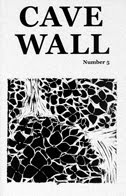 A recent note from Rhett Rhett Iseman Trull, Editor of Cave Wall, journal of poetry, is a good reminder of the importance of subscribing to literary magazines as a way to get great reading material in your hands, but also to help support these endeavors. It’s a tough time for us all, but collectively, subscriptions really can make a difference in helping mags through the year.
A recent note from Rhett Rhett Iseman Trull, Editor of Cave Wall, journal of poetry, is a good reminder of the importance of subscribing to literary magazines as a way to get great reading material in your hands, but also to help support these endeavors. It’s a tough time for us all, but collectively, subscriptions really can make a difference in helping mags through the year.
If you don’t already, take the step and subscribe to a couple. If you don’t “need” or want any more lit mags, then get a subscription for a friend, for your local library, elder care home, domestive violence shelter, juvie detention center, runaway home, high school creative writing class, prison, alternative high school, church – be creative! There are lots of organizations and groups that would probably really appreciate having good reading.
Even better – teachers! – get your students to subscribe as required reading – either to one specific journal for the whole class, or let them browse the NewPages list and pick one of their own choice. There are many creative ways to work with these in the classroom. Ordering a set of backcopies is also a quick and easy way to get the whole class on the same page. I’ve always had good luck with our bookstore ordering from small lit mags, and sometimes have ordered them myself and collected the money from my students. Do what you can to get students reading and keep these great publications going!
From Rhett: “There has never been a better time to subscribe to Cave Wall than this month, during our September 2009 Back Issue Sale, where current and new subscribers can purchase back issues 1-5 for just $4 each. If you have been wanting to subscribe, or if your subscription has lapsed and you missed a few issues, now is a great time to act. Also, with the holidays approaching, what better gift for a poetry lover than a complete set of Cave Wall back issues? In these difficult economic times, Cave Wall appreciates your support more than ever.”
Michigan Quarterly Review New Editor
The Summer 2009 issue of Michigan Quarterly Review welcomes Jonathan Freedman as the new editor, transitioning the close of Laurence Goldstein’s thirty-two year career with the publication.
Summer Deals on Absinthe & Bloggers Wanted
Absinthe: New European Writing is offering a summer sale now through August 31st. Purchase any back issue (except sold out issue #3) for only $5 (postage included; $10 outside the United States). This is a great opportunity to complete your Absinthe set. Additionally, until August 31st you can order a lifetime subscription to Absinthe for only $100(for international subscribers the lifetime rate is $200).
Absinthe is also looking for writers interested in contributing to their blog. If you’re interested, email the editor: dhayes_at_absinthenew.com
Some Notes on Character
*NOTE: Reposting with links to Conclave full-text. Thanks Valya.*
I ran across a couple of great editorials in the most recent issues of American Short Fiction and Conclave. Both speak the the nature of character in writing as well as, for Conclave, in photography. Below are some excerpted portions which create a kind of conversation between them.
From Editor Stacey Swann of American Short Fiction (44, Summer 2009):
Like most writers, I grew up reading books—loving the characters and their stories. But I also loved learning about the world. While I understood that Narnia was not a real place or Tom Sawyer a real person, I still invested a great deal of authority in authors: the way they viewed the world was correct on a fundamental level. This explains why studying John Keats’s “Ode on a Grecian Urn” in high school remains a vivid memory for me. It was the first time I strongly disagreed with what an author was espousing. No matter what Keats thought, no matter what my English teacher echoed, I was certain that beauty was not truth and truth was not beauty. It wasn’t just that many fundamental truths about the world were ugly; beauty wasn’t important enough to equate with truth.
It turns out that I was not alone in my distrust of this ode. In one of his critical essays, T. S. Eliot wrote that those last two lines were “a serious blemish on a beautiful poem, and the reason must be either that I fail to understand it, or that it is a statement which is untrue.” Eliot continued: “And I suppose that Keats meant something by it, however remote his truth and his beauty may have been from these words in ordinary use.”
In high school, I equated beauty with nothing more than an excessive prettiness. Beauty was something to be applied to objects, not actions. I recently realized that I had readjusted my definition of beauty, and I might now understand Keats’s meaning a little better. As I get older I see beauty in so many unexpected things. And when I think about short stories, it seems to me that most depict moments of beauty. While novels generally are about characters and large portions of their lives, short stories must value something else due to their compactness. So often, they are illuminations of an action with inherent beauty. The beauty may be sad or painful or wasted, but it is nonetheless beautiful.
Conclave, a new lit on the block, focuses on “character-driven writing and photography.” Founding Editor Valya Dudycz Lupescu discusses the selection process for their inaugural issue:
As we reviewed and narrowed the pool, the editors discussed what made the pieces character-focused. There was no rubric or list of points. Beyond obvious assessment of craftsmanship, so much of this process is subjective. How can one quantify the literature that compels us to read it?
William Faulkner once said, “It begins with a character, usually, and once he stands up on his feet and begins to move, all I can do is trot along behind him with a paper and pencil trying to keep up Tong enough to put down what he says and does.”
In a good character-driven story, the reader should be swept up into the lives of the characters, willing to trot alongside them as they tell their stories. In an excellent character-driven story, the reader is compelled to follow the characters anywhere, outside his or her comfort zone, into alien territory, or into new emotional depths. We willingly suspend all disbelief to immerse ourselves in their reality. These unforgettable characters are timeless. They reveal something about human nature that is archetypical and personal at the same time. [Full text here.]
Conclave Managing Editor Scott Markwell adds these comments to the consideration of character:
As we observe character, we also see how it changes, how people grow, stay static, or regress. . . . Character reveals the brightest and darkest places of who we are. Characters come alive when they reveal a truth, when they hold a mirror up to each of us. . . . Character comes in other interesting forms. We personify. The inanimate become real, become human, express features we see in others. We find character in metaphor and in the literalness of life’s events. We see the wisdom and ravages of age. . . . Character will change, but we hope the truth of the human experience will not. [Full text here.]
Which echoes Swann’s closing line:
Finally, returning to Keats, if these stories are about moments of beauty, there is something inextricably true about them as well. It is their truth that makes them beautiful.
[Swann’s full editorial available here.]
Ascent Online
Starting in August, Ascent Magazine will be moving from print to online. It would seem they have suspended their full website until then, but information about the journal and contact information can still be found on their NewPages sponsored listing. No explanation as yet for this move.
Indiana Review Giveaway
For the month of July, Indiana Review is giving away free copies of their newest issue (31.1 Summer 2009). Every Wednesday IR will post a question on their blog and the first correct response emailed to us will receive a free copy!
Exploring Ghana Through Obsidian
Yet another great literary publication through which global cultures and perspectives can be explored is Obsidian: Literature of the African Diasporas. The most recent issue (v8 i2 – don’t let the 2007 date throw you; it just came out) focuses on Ghana – “Honoring the Legacy and Literature of Independent Africa, 1957-2007.”
Editor Sheila Smith McKoy introduces the issue: “As the first sub-Saharan African country to gain its independence from its ‘colonizer,’ Ghana set the stage for the domino effect of freedom across the African continent…In this issue, Obsidian celebrates the legacies of Independent Africa, her literature, her cultures, and their impact across Africa, her Diaspora and our world.”
Poets in this issue include Kofie Anyidoho, Makuchi, Shane Book, and Sheila Smith McKoy – “all offer riffs on the issues that contextualize the experiences of African and Diasporan identity.” M. Genevieve West interviews Makuchi, several essays “provide diverse perspectives on Ghana and her legacy,” and Kim Coleman Foote contributes to the fiction.
Isotope on the Endangered List
This is indeed sad news for me, since it was only after reading Isotope that I believed English and science could really get along in the same mind of appreciation and learning. Something countless years of education failed to convince me of.
From the Terrain.org blog, posted by Simmons B. Butin:
I have very sad news to share — news I learned yesterday but wasn’t prepared to share until today (and I do have permission). As many of you know, Christopher Cokinos founded and has served as the editor of the outstanding journal Isotope: A Journal of Literary Nature and Science Writing for more than a decade now. Many of you also know that state university funding has been drastically cut nearly everywhere. Combine those two, and we learn that Utah State University will no longer be publishing Isotope.
Folks, Isotope is one of the three or four best environmental literary journals, and its closure is a huge blow not only to the good folks working on the journal at USU, but to environmental and science literature readers and writers everywhere. But what to do? We need to find a large endowment to sustain the journal, under Chris’s excellent editorial skills, and find it now. So ante up!
There is a possibility that Isotope will move to another university or other editing team, but unless it stays at USU, as far as I know Chris will no longer be the editor. That is sad, indeed.
Confess Your Secret Food
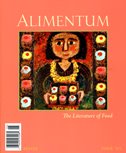 Alimentum: The Literature of Food has a special offer for new and renewing subscribers: “Tell us your Secret Food and receive one free issue! Your Secret Food is the food you love but tell no one about. Tell us and we’ll not only gift you an extra issue but broadcast your Secret Food on our website this Fall. Your chance for Food Fame!”
Alimentum: The Literature of Food has a special offer for new and renewing subscribers: “Tell us your Secret Food and receive one free issue! Your Secret Food is the food you love but tell no one about. Tell us and we’ll not only gift you an extra issue but broadcast your Secret Food on our website this Fall. Your chance for Food Fame!”
All you have to do is place a regular subscription order online (or by mail) then send Alimentum an email with your secret to secretfood[at]alimentumjournal[dot]com. You’ll get three issues for the price of two.
Missouri Review Awards
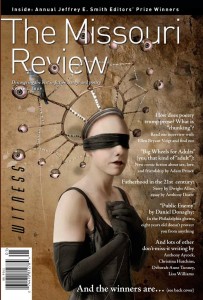 The most recent issue of The Missouri Review (v32n1) includes the winners of the Jeffrey E. Smith Editors’ Prize:
The most recent issue of The Missouri Review (v32n1) includes the winners of the Jeffrey E. Smith Editors’ Prize:
First Place Fiction: Roy Kesey, “Double Fish”
First Place Essay: Deborah Thompson, “What’s the Matter with Houdini?”
First Place Poetry: Frannie Lindsay (seven elegies)
Merdian Awards and New Editors Announced
 The newest issue of Merdian (22/May 09) includes the winners of the Editor’s Prize 2009:
The newest issue of Merdian (22/May 09) includes the winners of the Editor’s Prize 2009:
Fiction Winner Helen Phillips, “The Eyes of Cecile”
Fiction Finalist Nahal Suzanne Jamir, “In the Middle of Many Mountains”
Poetry Winner: Angus A. Bennett, “Muted with a Line from Someone Else’s Memory”
Also announced in this issue are next year’s editors: Jazzy Danziger, head editor; Jasmine Bailey, poetry editor; Kevin Allardice and Memory Peebles, fiction editors.
Happy 20th Free Lunch
Celebrating 20 years of publishing Free Lunch: A Poetry Miscellany, Editor Ron Offen and his staff look forward to many more years to come, as do their readers. Congrats!
Happy 50th MR
 The Massachusetts Review celebrates its 50th year of publishing, surviving, and thriving. Congrats MR!
The Massachusetts Review celebrates its 50th year of publishing, surviving, and thriving. Congrats MR!
Bits from Iowa Review
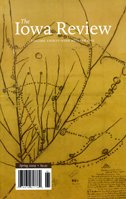 The Iowa Review offers a number of works from their most recent issue (v39n1) online, including a link to an audio excerpt of Tom Montgomery-Fate’s Saunter: A Conversation with Henry David Thoreau, and a work by Ron Tanner, “Cats as Tuna” which I will whet your appetite with here: “I filled a pot with housecats. The pot was my biggest. Still, there were a lot of cats. They didn’t seem to mind being in the pot. I knew they weren’t tuna. But I needed to make tuna salad. And all I had were cats. Cats always seem to be around and underfoot, winding through my legs. Cat hair floats through my house like dandelion down.”
The Iowa Review offers a number of works from their most recent issue (v39n1) online, including a link to an audio excerpt of Tom Montgomery-Fate’s Saunter: A Conversation with Henry David Thoreau, and a work by Ron Tanner, “Cats as Tuna” which I will whet your appetite with here: “I filled a pot with housecats. The pot was my biggest. Still, there were a lot of cats. They didn’t seem to mind being in the pot. I knew they weren’t tuna. But I needed to make tuna salad. And all I had were cats. Cats always seem to be around and underfoot, winding through my legs. Cat hair floats through my house like dandelion down.”
TriQuarterly’s Notes from Donna Seaman
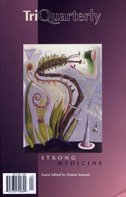 Booklist editor Donna Seaman was the guest editor for the most recent issue of TriQuarterly (133). In her introduction, she begins: “My respect for the mystery implicit in creativity runs high, so I decided not to interfere with the process in my role as guest editor for this brimming issue of TriQuarterly. I did not name a theme, or assign a topic. Instead, I sought out writers who see life whole, who are curious about the interconnectivity and complexity of existence, and who care, deeply and unabashedly, about the world. When asked what I was looking for, I simply said, ‘strong medicine.'”
Booklist editor Donna Seaman was the guest editor for the most recent issue of TriQuarterly (133). In her introduction, she begins: “My respect for the mystery implicit in creativity runs high, so I decided not to interfere with the process in my role as guest editor for this brimming issue of TriQuarterly. I did not name a theme, or assign a topic. Instead, I sought out writers who see life whole, who are curious about the interconnectivity and complexity of existence, and who care, deeply and unabashedly, about the world. When asked what I was looking for, I simply said, ‘strong medicine.'”
“Good writing,” she goes on, “is a tonic. The work of inquisitive, imaginative, unfettered, and courageous observers, thinkers, and dreamers provide succor. Heat and light. Food for thought and balm for pain. Lucid and compassionate literature breaks the isolating fever of the self.”
Seaman has more to say on the parallels of this soul-felt medicine, introducing numerous contributors in the issue and their works, but it was her closing remark on the concept I was most comforted by, as so often, I don’t find what I read so much soothing as jarring, awakening me to feelings unlike any salve should. Seaman addresses this as well: “Strong medicine may make you sick before it makes you better. Here, writers and readers alike face harsh truths about humankind’s diabolical paradoxes and planet-altering endeavors. Strong medicine goads us into asking questions, articulating objections, and fueling the coalescence, let us hope, of new ways of seeing, and new ways of being.”
Will my insurance cover this prescription of TriQuarterly? Oh, heck – the cover price is less than my co-pay, and no nasty side effects!
Lit Mag Survival
There’s always much being said on the issue of funding and support for literary magazine, whether they are associated with a university, non-profit arts organization, or completely “independent,” but now more than ever, there is a real concern about the survival of the literary magazine. Like the roots of an old oak, those concerns run deep, branching into areas far beyond simple finances.
A two-part manifesto Virginia Quarterly Review blog post brings a great deal of the matter into focus, with plenty of further reading reference:
The Future of University Presses and Journals (A Manifesto)
By Ted Genoways
May 9th, 2009
Whose Woods Are These? (A Manifesto, Part 2)
By Ted Genoways
May 14th, 2009
Via Carolyn Kellogg
Some Agni Bits
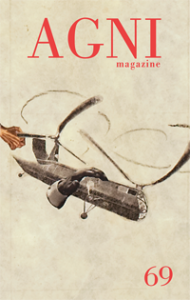 Agni has long been providing exclusive online content, unique and separate from the print publication, with the content of each carefully selected for the delivery mechanism. The newest print issue of Agni (69) indeed offers something not only unique to print, but wholly unique to Agni among literary magazines: an exceptionally well reproduced, two-sided, trifold foldout of the collage “Where Were You When the Moon Was Full” by Aldwyth. This is in addition to several other color and black and white images to accompany Rosamond Purcell’s art feature on Aldwyth, “In Her Hand: The Art World Goes to War.”
Agni has long been providing exclusive online content, unique and separate from the print publication, with the content of each carefully selected for the delivery mechanism. The newest print issue of Agni (69) indeed offers something not only unique to print, but wholly unique to Agni among literary magazines: an exceptionally well reproduced, two-sided, trifold foldout of the collage “Where Were You When the Moon Was Full” by Aldwyth. This is in addition to several other color and black and white images to accompany Rosamond Purcell’s art feature on Aldwyth, “In Her Hand: The Art World Goes to War.”
Also included in this issue, the Editor’s Note by Sven Birkerts, “What Remains,” honors the lives of David Foster Wallace and John Updike through a thoughtful remembrance of their writing. As only Birkerts can, these comments truly honor without gushing, and say a great deal more about the place of writers in our memories. Worth a read regardless of your fan status with either author.
Literary Canada’s Fight for Survival
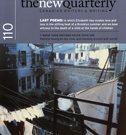 Canadian lit mags are still putting a call out for support. According to Managing Editor Rosalynn Tyo of The New Quarterly, “the Department of Canadian Heritage plans to eliminate funding for magazines with less than 5000 in annual ciculation as of April 2010…All that would remain on the table, of what’s on my table anyway, is Geist and Canadian Living.”
Canadian lit mags are still putting a call out for support. According to Managing Editor Rosalynn Tyo of The New Quarterly, “the Department of Canadian Heritage plans to eliminate funding for magazines with less than 5000 in annual ciculation as of April 2010…All that would remain on the table, of what’s on my table anyway, is Geist and Canadian Living.”
Like so many other quality, small literary publications, TNQ and other Canadian magazines could probably get by for a short period of time without this support, but more to the point is demanding the arts continue to be recognized for their cultural value and importance and supported as such. Not, as Tyo points out, forcing profitability and commercial viability as the marker of survival. Some things we just know are good for us, even if they don’t make us rich.
Speaking from a state (Michigan) where we’ve seen massive funding cuts for arts and historical organizations, it’s a sad, sad existence. And once it’s taken away, don’t think you’re going to see it back any time soon. Fight while you still can, Canada, and for those of you with any say in this, visit TNQ‘s website for information on how to participate. Of course, purchasing subscriptions always helps.
What’s New at Antioch Review?
According to Editor Robert Fogarty, the Antioch Review Spring 2009 issue introduces the new feature From Our Archives: “Beginning with this issue we will reprint a famous piece from our archives (essays, stories, poems).”
I’ve previously heard some controversy about publications doing this, as reprinting already published works takes up valuable real estate that hungry new writers are ever eager to fill. However, Antioch‘s approach to this, simply stated, is intriguing: “Read it and see how it stood the test of time. Is it gold or pyrite?”
Regardless of the hungry masses, this is a great question to ask and have the opportunity to explore. As often as I run across “old” lit mags and am thrilled to find some of the first works of now-famous authors, there are far more where-are-they-now authors. Granted, we can’t all be famous, or even a recognized name, but probably more the issue: is what was written for the time, or for all time? And does its having been the former rather than the latter render it “pyrite”? I’ll be interested to see what Antioch discovers with their new feature and some feedback from their readers.
Farewell to The Puritan
The Puritan Editors Spencer Gordon and Tyler Willis have sent notice that as of May 1, 2009, “The Puritan is officially out of commission.” Citing “including insurmountable financial debt, a dramatic change in location, and the current abysmal economy,” the magazine will be on “permanent hiatus.” As with so many mags, that pretty much means done unless a lot of money were to fall into their laps. Our thanks to The Puritan for their work in bringing new voices onto the lit scene for so many years.
Antioch and Cowboy Education
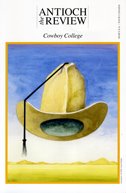 Intrigued as I am by magazine covers, the “Cowboy College” line on the cover of Antioch Review (Spring 2009) drew me in. Editor Robert Fogerty takes a moment to introduce Bruce Fleming’s lead essay on his ‘student-centered-learning’ experience at Deep Springs, “a unique educational endeavor located in the wilderness in California.” Fogerty writes, “There is more here than a look at a quirky college; it is, rather, an examination of educational vlaues and vexing questions about authority and a look at a slice of contemporary youth culture. And most important it is an essay that looks at a much more fundamental issue: what is the purpose of an education?” Explored, though I don’t dare say answered in Flemings essay, this is just the start of a very diverse, conversation-starter issue of Antioch.
Intrigued as I am by magazine covers, the “Cowboy College” line on the cover of Antioch Review (Spring 2009) drew me in. Editor Robert Fogerty takes a moment to introduce Bruce Fleming’s lead essay on his ‘student-centered-learning’ experience at Deep Springs, “a unique educational endeavor located in the wilderness in California.” Fogerty writes, “There is more here than a look at a quirky college; it is, rather, an examination of educational vlaues and vexing questions about authority and a look at a slice of contemporary youth culture. And most important it is an essay that looks at a much more fundamental issue: what is the purpose of an education?” Explored, though I don’t dare say answered in Flemings essay, this is just the start of a very diverse, conversation-starter issue of Antioch.
Zyzzyva: Textimage in Review
 The Spring 2009 issue of Zyzzyva offers readers a unique look at “textimage” with over 100 contributions in this single collection.
The Spring 2009 issue of Zyzzyva offers readers a unique look at “textimage” with over 100 contributions in this single collection.
From the Editor’s Note:
“Digital screens mash up words and pictures and videos and sound and links (to everything). The printed page segregates elements, putting them into their linear, orthogonal, rightful places.
“In this issue, we explore the spectrum of textimage, instances in which text and image collide and collude on the page-from the artist playing with that basic literary unit, the letter, to the writer sketching and doodling in his notebook.
Our take is not scholarly, but deliberately ecumenical, using examples from our pages over the past quarter century…”
Read more from Howard Junker, as well as view several of the works from this issue on Zyzzyva.
MQR Names New Editor
Jonathan Freedman, University of Michigan Professor of English and American Culture, has been named editor of Michigan Quarterly Review, the University of Michigan’s flagship scholarly and literary journal. Professor Freedman holds a B.A. from Northwestern and an M.A. and Ph.D. from Yale University, where he taught before coming to Michigan. He has also taught at Caltech, Oxford University, and the Bread Loaf School of English. He is the author of three books: Professions of Taste (1991), The Temple of Culture (2001), and Klezmer America (2007), and has edited numerous other volumes, including, with Sara Blair, Jewish in America, originally a special issue of MQR. In addition to his previous work with MQR, Freedman was a founding editor of the Yale Journal of Criticism and a member of its editorial collective.
MQR is a journal of the humanities, publishing essays, interviews, memoirs, fiction, poetry, and book reviews. Since 1977 MQR has been edited by University of Michigan Professor of English Laurence Goldstein, whose acute literary sensibilities and critical discernment have made the magazine an important venue for new creative work, and whose broad interests have encouraged its interdisciplinary scope.
He instituted the practice of devoting one issue a year to the exploration across disciplines of some topic of special interest, which has ranged from 1979’s “The Moon Landing and Its Aftermath” and 1980-81’s “The Automobile and American Culture” to the recent volumes on “Vietnam: Beyond the Frame,” The Documentary Imagination,” and “China.” In the last two decades MQR has published work by Margaret Atwood, Robert Coles, Carol Gilligan, Maxine Hong Kingston, Barry Lopez, Czeslaw Milosz, Toni Morrison, Joyce Carol Oates, Richard Rorty, Eric J. Sundquist, John Updike, William Julius Wilson, and other authorities in their fields, as well as some of the finest contemporary fiction and poetry. Work appearing in MQR is often selected for inclusion in anthologies such as the annual Pushcart Prize, Best American Essays, and Best American Poetry.
Professor Goldstein will complete his editorship with the Spring 2009 issue of MQR.
Responding to Canada
In “Why should I pay for your hobby?” (MastheadOnline) Stacey May Fowles responds to the CPF’s established 5,000 annual circulation floor and the ignorance it will sustain: “But if you can’t get your business going, why should the average Canadian taxpayer be responsible for your personal passion? Your niche interests? Your ‘little’ magazine?”
Just When You Thought Canada Was Better
Literary publishers protest cuts
Malahat Review among smaller periodicals facing loss of funding
By Randy Boswell, Canwest News Service
March 11, 2009
“The new Canada Periodical Fund, announced last month by Heritage Minister James Moore and still being designed by government officials, would deny certain federal grants to most publications with annual sales of fewer than 5,000 copies. ‘The government is improving the way it does business to meet the changing needs of Canadians,’ Moore said when the program was announced in February. ‘The way in which support to Canadian periodicals is delivered will be reformed to maximize value for money and to seize opportunities in today’s global, technological environment.'” [read the rest here]
River Teeth Celebrates 10 in Quiet Style
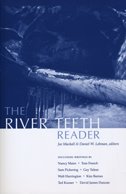 Without the usual fanfare I’ve seen on lit mag covers and PR, River Teeth celebrates its 10th year of publication with a fabulously packed double issue. I was surprised at the size, which is what led me to the Editors’ Notes (mind you even seeing “Volume 10” didn’t set off any anniversary alarms). As quietly and as calmly as their publication has always presented itself (same gorgeous blue-tinted cover), Editors Joe Mackall and Daniel W. Lehman make no grand statements about a decade of publishing creative non-fiction. Instead, and as always, they defer to the efforts of their writer’s and to their ever-important readership:
Without the usual fanfare I’ve seen on lit mag covers and PR, River Teeth celebrates its 10th year of publication with a fabulously packed double issue. I was surprised at the size, which is what led me to the Editors’ Notes (mind you even seeing “Volume 10” didn’t set off any anniversary alarms). As quietly and as calmly as their publication has always presented itself (same gorgeous blue-tinted cover), Editors Joe Mackall and Daniel W. Lehman make no grand statements about a decade of publishing creative non-fiction. Instead, and as always, they defer to the efforts of their writer’s and to their ever-important readership:
“Ten years ago we penned the first editors’ notes to our readers. At this point ten years later, we should be writing at length about our humble beginnings and singing of the heights we’ve reached. Our words should reveal just the right amount of nostalgia, pride, and just a hint of self-congratulation. But there is no time for that; or rather, no space.
“We have to keep this note short. In the ten years River Teeth: A Journal of Nonfiction Narrative has been around, we have received over twenty thousand submissions, and we’ve published about three hundred of those twenty thousand. Most of what we reject is the work of fine writers. And now we’ve had to reject the work of writers whose work we’ve previously accepted. Worse than that – we’ve had to reject the very same pieces we once accepted! We had to choose the best forty or so pieces of the three hundred we’ve published. To make matters worse, we’ve had to divide the pieces up into four categories: Essay, Memoir, Literary Journalism, and Craft and Criticism. If there were no space concerns, we’d write a few sentences about how difficult it can be to say, for instance, where memoir ends and a kind of literary journalism begins, and how much we like pieces that flirt with those boundaries. If we had more space, we’d brag about our Pushcart Prize and our Best American Essays. We’d love to pat ourselves on the back and tell you how many Pulitzer Prize winners we’ve published — and with even more pride — shine a light on the people whose River Teeth publication was their first.
“Saying no to our own writers was the hardest thing we’ve had to do as editors. We hate to reject a piece we love because there’s simply no more space. So the best thing we can do right now is to shut up, and thank you for reading.”
Lit Mag Covers Matter
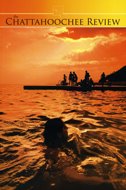 Can I just say how happy I am with the new Chattahoochee Review covers? Okay, I will. Not that traditionally-styled lit mag covers don’t have their place, but with the concern about lit mags being able to survive these days, and the more “image-driven” culture in which we live, it does become more important (perhaps critical) for publications to be able to “catch” new readers. Covers are the place we all begin, like it or not: we do judge our reading material by this to some degree. Funny enough, you can’t even find an image of CR‘s old cover on their website. Erased from memory. Perhaps they’ll end up as collector’s editions on ebay.
Can I just say how happy I am with the new Chattahoochee Review covers? Okay, I will. Not that traditionally-styled lit mag covers don’t have their place, but with the concern about lit mags being able to survive these days, and the more “image-driven” culture in which we live, it does become more important (perhaps critical) for publications to be able to “catch” new readers. Covers are the place we all begin, like it or not: we do judge our reading material by this to some degree. Funny enough, you can’t even find an image of CR‘s old cover on their website. Erased from memory. Perhaps they’ll end up as collector’s editions on ebay.
Iowa Review Awards
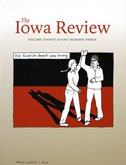 The Iowa Review, Winter 2008/09, features Winners of the 2008 Iowa Review Awards:
The Iowa Review, Winter 2008/09, features Winners of the 2008 Iowa Review Awards:
Nonfiction: Nancy Geyer for “Where the Children Are”
Poetry: Dave Snyder for “Bamboo Poem”
Fiction: Andrew Mortazavi for “Stop Six, Ft. Worth”
IR also announced a tie for the Tim McGinnis Award for 2008 for “the most unusually pleasing and unexpected work of the year” : Jim Barnes (“Five Villanelles,” Spring 2008) and Ron Carlson (“Victory at Sea,” in this current issue).
IR makes several works from their most current issue available online.
MQR :: Emma’s Father – Dementia?
The newest issue of Michigan Quarterly Review (under the new editorial guidance of Jonathan Freedman, University of Michigan Professor of English and American Culture) includes an article by Margaret Morganroth Gullette: “Annals of Caregiving: Does Emma Woodhouse’s Father Suffer from ‘Dementia’?” For Austen fans, this is a compelling analysis, ready for controversy: “Some readers may deny that Mr. Woodhouse has any form of cognitive impairment, veering back to the simplicities of the ‘polite old man’ characterizations and ignoring the tender manipulations of his caregivers that I have tried to put into relief. Many of us may be diminished in our capacity to connect his condition with our contemporary contest…one of the old people Americans fear most – even, sometimes when they are our own relatives.”
Ecotone’s Contribution to Evolution
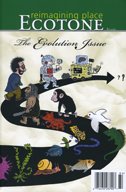 Ecotone‘s latest issue is a whopping 430 pages – a double issue – in celebration of the bicentennial of Charles Darwin’s birth and the sesquicentennial of the publication of The Origin of Species. The editorial alone (“Hey, Hey, We’re the Monkeys) is worth the issue price, in reading how David Gessner once taught a course called “When Thoreau Met Darwin.”
Ecotone‘s latest issue is a whopping 430 pages – a double issue – in celebration of the bicentennial of Charles Darwin’s birth and the sesquicentennial of the publication of The Origin of Species. The editorial alone (“Hey, Hey, We’re the Monkeys) is worth the issue price, in reading how David Gessner once taught a course called “When Thoreau Met Darwin.”
The issue includes winners of the 2008 Ecotone Evoluntion Contest, judeged by Jennifer Ackerman:
First Prize: Emily Taylor for her short story “Beginning”
Second Prize: Kathryn Miles for her essay “Dog Is Our Copilot
Third Prize: Lynn Pederson for her poem “On Reading about the Illness adn Death of Darwin’s Daughter Annie
And a shout out to Jennifer Sinor for her essay, “The Certainty of Spinning,” and for Birkerts fans (me!), he’s here too, with the nonfiction piece, “The Points of Sail.”
A Nod to Nester
Thanks to Daniel Nester for mentioning NewPages as a “best online portal” in The Library Journal‘s January installment of The Magazine Rack. Magazines mentioned in this column include Cave Wall, Bateau, 1913, The Lumberyard, Caketrain, Alimentum, Habitus, Chautauqua, Atlas, and Greatest Uncommon Denominator.
Classroom Rates :: Georgia Review
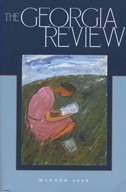 Special classroom rates of the Georgia Review are available to instructors and college bookstores. Single issues are $6 instead of $10, and a student subscription rate is $24 instead of $30 for one year (four issues). As an added bonus, for every ten subscriptions, GR provides one free. Students: don’t hesitate to ask your instructors to assign this as a class text!
Special classroom rates of the Georgia Review are available to instructors and college bookstores. Single issues are $6 instead of $10, and a student subscription rate is $24 instead of $30 for one year (four issues). As an added bonus, for every ten subscriptions, GR provides one free. Students: don’t hesitate to ask your instructors to assign this as a class text!
The Spring 2009 issue will focus on culture and the environment, with essays by Alison Hawthorne Deming, David Gessner, Scott Russell Sanders, Reg Saner, and Lauret Edith Savoy. Also featuring works by Alice Friman, Margaret Gibson, Jeff Gundy, David Huddle, Greg Johnson, Maxine Kumin and others.
New Ohio Review Update
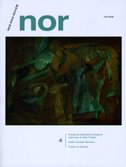 Beginning with its fifth issue, New Ohio Review‘s contributors will receive honoraria of $10/page for prose and $15/page for poetry, $30 minimum, in addition to two copies of the issue and a one-year subscription.
Beginning with its fifth issue, New Ohio Review‘s contributors will receive honoraria of $10/page for prose and $15/page for poetry, $30 minimum, in addition to two copies of the issue and a one-year subscription.
Grace Paley Fans
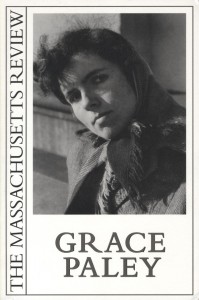 Grace Paley fans, you’ll want to pick up a copy of the most recent Massachusetts Review (or better yet, subscribe!). The entire issue is devoted to Paley and includes works by Mark Doty, Janet Kauffman, Terry Gross, Naomi Shihab Nye, William O’Rourke, and of course many selections by Grace Paley as well as contributions from her daughter, Nora Paley. Eight pages of Paley’s manuscript are included, complete with her handwritten notes.
Grace Paley fans, you’ll want to pick up a copy of the most recent Massachusetts Review (or better yet, subscribe!). The entire issue is devoted to Paley and includes works by Mark Doty, Janet Kauffman, Terry Gross, Naomi Shihab Nye, William O’Rourke, and of course many selections by Grace Paley as well as contributions from her daughter, Nora Paley. Eight pages of Paley’s manuscript are included, complete with her handwritten notes.
You Had Me at Cello
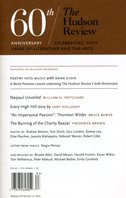 The newest issue of The Hudson Review (Autumn 2008), celebrating its 60th anniversary, includes a CD: “Poetry into Music with Dana Gioia.” The CD includes the intro track with Gergory Hesselink on cello and baritone, Leon Williams. Dana Gioia speaks on intermittent “Conversations” tracks between combined singers and musicians. A great holiday gift (if you’re STILL shopping).
The newest issue of The Hudson Review (Autumn 2008), celebrating its 60th anniversary, includes a CD: “Poetry into Music with Dana Gioia.” The CD includes the intro track with Gergory Hesselink on cello and baritone, Leon Williams. Dana Gioia speaks on intermittent “Conversations” tracks between combined singers and musicians. A great holiday gift (if you’re STILL shopping).
17 Years Ago Today
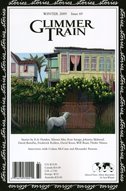 This short preface to the Winter 2009 issue of Glimmer Train was a nice look back. It’s not a birthday or anniversary, just years of living life and saying, Whew! it’s been a long road, a hard road, and a bad road, and a good road: “Seventeen years ago we published our first issue of Glimmer Train Stories. The Gulf War had just ended, the Soviet Union was collapsing, the first-ever documented South Atlantic tropical cyclone developed in the Southern Hemisphere, the Dow passed 3000 for the first time, Tim Berners-Lee released an article describing his idea for the World Wide Web, and the first President Bush was in the final year of his presidency. We’re sending this issue to press just weeks before the November 4 election, an old chapter closing and a new one pushing open. And for the two of us, as well: We have now both crossed into our second half-century, and life is a compelling as it’s ever been. It’s good being alive, being sisters, and doing this work.” Susan and Linda – keep it going girls!
This short preface to the Winter 2009 issue of Glimmer Train was a nice look back. It’s not a birthday or anniversary, just years of living life and saying, Whew! it’s been a long road, a hard road, and a bad road, and a good road: “Seventeen years ago we published our first issue of Glimmer Train Stories. The Gulf War had just ended, the Soviet Union was collapsing, the first-ever documented South Atlantic tropical cyclone developed in the Southern Hemisphere, the Dow passed 3000 for the first time, Tim Berners-Lee released an article describing his idea for the World Wide Web, and the first President Bush was in the final year of his presidency. We’re sending this issue to press just weeks before the November 4 election, an old chapter closing and a new one pushing open. And for the two of us, as well: We have now both crossed into our second half-century, and life is a compelling as it’s ever been. It’s good being alive, being sisters, and doing this work.” Susan and Linda – keep it going girls!
New at West Branch
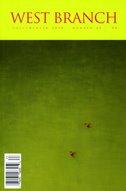 West Branch Editor Paula Closson Buck introduces a few new names to the publication starting with this latest issue – Fall/Winter 2008. New Advisory Editors include Shara McCallum, Chris Camuto, Deidre O’Connor, Robert Rosenberg, and G. C. Waldrep. Dinty Moore will become a contributing editor drumming up creative nonfiction submissions. And a new feature from Contributing Editor Garth Greenwell will be the annual column “To a Green Thought” – this issue includes the first installment: “Beauty’s Canker: On Jorie Grahma.” (Linked because it’s generously available full-text on the WB site.)
West Branch Editor Paula Closson Buck introduces a few new names to the publication starting with this latest issue – Fall/Winter 2008. New Advisory Editors include Shara McCallum, Chris Camuto, Deidre O’Connor, Robert Rosenberg, and G. C. Waldrep. Dinty Moore will become a contributing editor drumming up creative nonfiction submissions. And a new feature from Contributing Editor Garth Greenwell will be the annual column “To a Green Thought” – this issue includes the first installment: “Beauty’s Canker: On Jorie Grahma.” (Linked because it’s generously available full-text on the WB site.)
Holiday Shopping? An Easy Suggestion from NewPages
I am absolutely NOT a shopper, let alone a holiday shopper. Ugh! So, my suggestion to help save time and gas, avoid the crowds, and support independent publishing? The coolest, easiest, bestest gift you could possibly give this holiday season:
A MAGAZINE SUBSCRIPTION!
Visit the links on NewPages Guide to Literary Magazines and NewPages Guide to Alternative Magazines. Most mags are set up to take payments online, but there is also still time to print an order form and get it sent in. Some mags even offer a discount gift subscription if you get one for yourself as well. (Replies from mags offering this are welcome on this blog!)
Given the price of some of the mags, you could even mix and match a couple – maybe an annual with a quarterly, an alternative mag and a literary mag, one poetry and one fiction mag – the creative possibilities are endless!
Don’t think anyone on your list would “appreciate” this idea? (Well, first of all, get some new people on your list!) Then “gift” yourself a subscription or two, tell others it’s what you want if they insist on buying you something, send a subscription to your local high school creative writing teacher, library, senior center, shelter, teen center, prison, political official who could use (more) poetry, etc.
‘Tis always the season to support lit/alt mags!
Mississippi Review Must Have
 The newest issue of Mississippi Review is a stunner for those of us who love our literary magazines, and a must have, must keep issue for its importance of historical literary record. No need to wait until later to say how integral this issue is; it’s clear from the moment you hold it in your hands. The issue is themed “Literary Magazines” and includes four parts:
The newest issue of Mississippi Review is a stunner for those of us who love our literary magazines, and a must have, must keep issue for its importance of historical literary record. No need to wait until later to say how integral this issue is; it’s clear from the moment you hold it in your hands. The issue is themed “Literary Magazines” and includes four parts:
Part One: The Literary Magazine Today
An Interview with Antioch Review Editor Robert Fogarty by Gary Percesepe
Reasons for Creating a New Literary Magazine by Jill Allyn Rosser, Editor of New Ohio Review
A Roundtable on the Contemporary Literary Magazine with Jill Allyn Rosser, New Ohio Review; Speer Morgan, The Missouri Review; Marco Roth, N+1; Raymond Hammond, The New York Quarterly; Todd Zuniga, Opium Magazine; Eli Horowiz, McSweeney’s; Aaron Burch, Hobart
Some Comments by Herbert Leibowitz
The Changing Shape of Literary Magazines; or “What the Hell is This Thing?” by Jodee Stanley, Editor of Ninth Letter
Comments on the Literary Magazine by Richard Burgin
Part Two: The Editors Introduce
“MR asked the editors contributing to this issue to introduce a writer they have published that they found particularly exciting, working in new and interesting ways, or otherwise deserving of more attention.” In this, you’ll find works by Claire Bateman, John Brandon, Daniel Grandbois, Rene Houtrides, John Leary, Maureen McCoy, B. R. Smith, and Catherine Zeidler.
Part Three: Writers on Lit Mags
Explanatory enough. Contributors include: Jane Armstrong, T.C. Boyle, Mary Grimm, Victoria Lancelotta, Rick Moody, Benjamin Percy, Stacey Richter, Jim Shepard, and James Whorton, Jr.
Part Four: Lit Mag Miscellany
Includes quotes about lit mags, a perspective and history on the contributor bio, and notes on the history of lit mags.
All I can say is I can’t remember when I was ever disappointed about an upcoming holiday because I felt as though spending time with family would take away from my reading time. . . but it is a long car ride north, so I might just be able to fit it all in.
NewPages Updates :: Submissions & Mag Stand
Calls for Submissions was recently updated. If you have a CFS you’d like to see posted, e-mail me: denisehill-at-newpages.com
Also updated – The Magazine Stand – featuring sponsored print and online lit mags as well as a list of links to all mags received. Want your publication listed here? Then send print copies (NewPages, POB 1580, Bay City, MI 48706) or a notice of new online editions (denisehill-at-newpages.com).
Florida Review :: Bits and Pieces
 Flipping through the Spring 2008 issue of Florida Review, I came across a few items of note. I see Billy Collins has two poems in this issue. He’d previously sent his work to FR and been published, and it raised a question about how lit mags deal with “really famous writers” sending in their work. Do they get picked because they’re famous and will help to promote/sell the magazine? Or do they get picked on the merit of their work? In which case, they’d be as likely to not get picked, right? I’ve had a lot of conversations with a lot of editors about this situation, and even though I hear them say it’s about the merit of the work, there’s always a footnote of commentary about how it helps the magazine. That is the business end of the literature, though. There is also a different level of scrutiny on the authors – to be well known and published raises this question, sort of like doping in sports – to achieve is to be suspect. Even famous poets get rejected. Sounds like a good title for something. I’m not saying anything about the quality of Collins’ work in this publication, just commenting on the situation.
Flipping through the Spring 2008 issue of Florida Review, I came across a few items of note. I see Billy Collins has two poems in this issue. He’d previously sent his work to FR and been published, and it raised a question about how lit mags deal with “really famous writers” sending in their work. Do they get picked because they’re famous and will help to promote/sell the magazine? Or do they get picked on the merit of their work? In which case, they’d be as likely to not get picked, right? I’ve had a lot of conversations with a lot of editors about this situation, and even though I hear them say it’s about the merit of the work, there’s always a footnote of commentary about how it helps the magazine. That is the business end of the literature, though. There is also a different level of scrutiny on the authors – to be well known and published raises this question, sort of like doping in sports – to achieve is to be suspect. Even famous poets get rejected. Sounds like a good title for something. I’m not saying anything about the quality of Collins’ work in this publication, just commenting on the situation.
I’m also pleased to see FR include a couple comics, one by Jeffery Brown and one by Rachel and Beverly Luria. It’s a lot to dedicate as many pages to a comic as they need to tell their story, but a trend I hope to see more of in other lit mags.
And lastly, just a nod to Lisa K. Buchanan, a once-upon-a-time reviewer for NewPages. She’s got a nonfiction piece in here, “Tips for the Busy Conversationalist.” It’s an intense exploration that plays well with the self-help style. Nod.
ZYZZYVA Seeks a New Editor
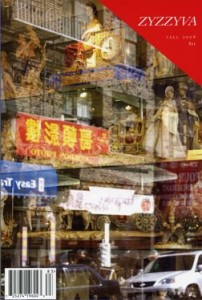 In the Editor’s Note of the most recent ZYZZYVA, Howard Junker announces his intent to retire from the magazine, which is now seeking his successor, someone who “will have to be different, will have to take a new direction, because the times have changed.” The informal job description Junker gives draws upon a response he once gave to a Paris Review Questionnaire about “the key ingredients needed to keep a literary magazine afloat.” Junker writes: “Taking its editor George Plimpton as my model, I declared: An independent income is the basic flotation device. Having the office in the editor’s basement reduces rent and the editor’s commute. Also helpful because, even if the budget remains modest, attracting money is key: good looks, charm, guts, a thick skin, a sense of humor, a good work ethic, luck, and the ability to spot and nurture talent.” Sound like anybody you know? If so, Junker closes his editorial: “If you have someone in mind, please let me know.”
In the Editor’s Note of the most recent ZYZZYVA, Howard Junker announces his intent to retire from the magazine, which is now seeking his successor, someone who “will have to be different, will have to take a new direction, because the times have changed.” The informal job description Junker gives draws upon a response he once gave to a Paris Review Questionnaire about “the key ingredients needed to keep a literary magazine afloat.” Junker writes: “Taking its editor George Plimpton as my model, I declared: An independent income is the basic flotation device. Having the office in the editor’s basement reduces rent and the editor’s commute. Also helpful because, even if the budget remains modest, attracting money is key: good looks, charm, guts, a thick skin, a sense of humor, a good work ethic, luck, and the ability to spot and nurture talent.” Sound like anybody you know? If so, Junker closes his editorial: “If you have someone in mind, please let me know.”
Antioch Fiction Issue :: Difficult Choices
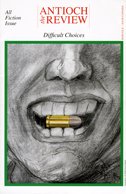 The all-fiction issue of The Antioch Review is out. Editor Robert Fogarty comments on the subtitle “Difficult Choices” – about the range of difficult choices faced by the submissions (aka slush) readers. Their choice, which often involves “the dreaded ‘r’ word” becomes what Fogarty refers to as the Key Question: “Should we publish this story or should we encourage to writer to send on another, better story?” Better than saying the story is rejected, I like Fogarty’s perspective of encouragement, which promotes the concept a writers community – a reason why so many people got into publishing lit mags in the first place.
The all-fiction issue of The Antioch Review is out. Editor Robert Fogarty comments on the subtitle “Difficult Choices” – about the range of difficult choices faced by the submissions (aka slush) readers. Their choice, which often involves “the dreaded ‘r’ word” becomes what Fogarty refers to as the Key Question: “Should we publish this story or should we encourage to writer to send on another, better story?” Better than saying the story is rejected, I like Fogarty’s perspective of encouragement, which promotes the concept a writers community – a reason why so many people got into publishing lit mags in the first place.
Being responsive to their writers, Fogarty says they must make a “firm and quick judgement about a story” – but there is no doubt they are also good at what they do, with a number of their fiction writers having received awards and placement in “best of” collections. “I expect,” Fogarty writes, “that several of the writers included in this issue will in the future make a ‘best’ list.” That kind of comment makes it no difficult choice at all to pick up this mag and give it a look see!
NewPages Welcomes New Sponsors
decomP is an online literary magazine that is updated monthly. decomP has been in existence since April 2004 and was originally called Decomposition Magazine. Contributors range from all over the country, and recently, an increased fan base in places like London and Scotland. decomP publish prose, poetry, art, and solicited book reviews. decomP is currently open for submissions.
River Teeth is a biannual creative nonfiction journal co-edited by Joe Mackall and Dan Lehman with the assistance of students in the low-residency MFA program at Ashland University. Founded in 1999, River Teeth combines the best of creative nonfiction, including narrative reportage, essays, and memoirs, as well as critical essays that examine the genre and that explore the impact of nonfiction narrative on the lives of its writers, subjects, and readers. River Teeth is currently open for submissions.
To Note or Not to Note Contributors
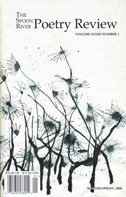 The most recent issue of Spoon River Poetry Review includes an interesting commentary from Editor Bruce Guernsey on the inclusion or not of contributors notes in a literary publication. (And is it contributors / contributor’s / contributors’ – I’ve seen all of these!)
The most recent issue of Spoon River Poetry Review includes an interesting commentary from Editor Bruce Guernsey on the inclusion or not of contributors notes in a literary publication. (And is it contributors / contributor’s / contributors’ – I’ve seen all of these!)
Bruce Guernsey addresses SRPR‘s choice to omit these notes – I would recommend your picking up the most recent issue to read his comments in full. In less than two pages, he succinctly and thoroughly discusses the practical issue of space in a print publication as well as the “symbolic” issue of wanting readers to focus on the poem rather than “the celebrity mentality that infects the current poetry scene.” Though Guernsey admits he is just as guilty of going to contributors notes “in this all-too-competitive market world” to see “where so-and-so has recently published.”
Interestingly enough, a SRPR reader sent in an e-mail saying contributors notes help know where else to find an author’s work. And my response to this was the same as Guernsey’s: “Look on the Internet.” It does seem to be the knee-jerk response to any question we have these days, and it’s Guernsey’s comment on this that I found most poignant: “…given the sources we now have on the Internet, that information can almost always be easily found online. Speed and information go well together. It’s poetry, that primitive technology, which is slow going and belongs in journals and books – when we can’t be there to hear it, anyway.”
New Lit on the Block :: The Normal School
“The Normal School is a bi-annual journal featuring nonfiction, fiction, poetry, criticism and culinary adventure journalism. We are nestled happily into the California State University at Fresno like a comfy spore in a benign and mighty lung. We dig quirky, boundary-challenging, energetic prose and poetry with innovations in content, form, and focus, which isn’t actually as high-falutin’ as it sounds. We’re just sort of the lit mag equivalent of the kid who always has bottle caps, cat’s eye marbles, dead animal skulls, little blue men and other treasures in his pockets.”
The Normal School accepts submissions of nonfiction, fiction, poetry, criticism, culinary adventure journalism, and video and audio essays. No previously published works, sim/subs okay.
Subscriptions are $20 for for two years (4 issues) and can be ordered online using PayPal. Single issues are $7 each.
